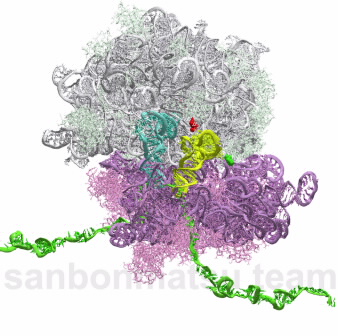FOR IMMEDIATE RELEASE | April 06, 2008
Meteorites delivered the “seeds” of Earth’s left-hand life
NEW ORLEANS, April 6, 2008 – Flash back three or four billion years — Earth is a hot, dry and lifeless place. All is still. Without warning, a meteor slams into the desert plains at over ten thousand miles per hour. With it, this violent collision may have planted the chemical seeds of life on Earth.
Scientists presented evidence today that desert heat, a little water, and meteorite impacts may have been enough to cook up one of the first prerequisites for life: The dominance of “left-handed” amino acids, the building blocks of life on this planet.
In a report at the 235th national meeting of the American Chemical Society, Ronald Breslow, Ph.D., University Professor, Columbia University, and former ACS President, described how our amino acid signature came from outer space.
Chains of amino acids make up the protein found in people, plants, and all other forms of life on Earth. There are two orientations of amino acids, left and right, which mirror each other in the same way your hands do. This is known as “chirality.” In order for life to arise, proteins must contain only one chiral form of amino acids, left or right, Breslow noted.
“If you mix up chirality, a protein’s properties change enormously. Life couldn’t operate with just random mixtures of stuff,” he said.
With the exception of a few right-handed amino acid-based bacteria, left-handed “L-amino acids” dominate on earth. The Columbia University chemistry professor said that amino acids delivered to Earth by meteorite bombardments left us with those left-handed protein units.
“These meteorites were bringing in what I call the ‘seeds of chirality,’” stated Breslow. “If you have a universe that was just the mirror image of the one we know about, then in fact, presumably it would have right-handed amino acids. That’s why I’m only half kidding when I say there is a guy on the other side of the universe with his heart on the right hand side.”
These amino acids “seeds” formed in interstellar space, possibly on asteroids as they careened through space. At the outset, they have equal amounts of left and right-handed amino acids. But as these rocks soar past neutron stars, their light rays trigger the selective destruction of one form of amino acid. The stars emit circularly polarized light—in one direction, its rays are polarized to the right. 180 degrees in the other direction, the star emits left-polarized light.
All earthbound meteors catch an excess of one of the two polarized rays. Breslow said that previous experiments confirmed that circularly polarized light selectively destroys one chiral form of amino acids over the other. The end result is a five to ten percent excess of one form, in this case, L-amino acids. Evidence of this left-handed excess was found on the surfaces of these meteorites, which have crashed into Earth even within the last hundred years, landing in Australia and Tennessee.
Breslow simulated what occurred after the dust settled following a meteor bombardment, when the amino acids on the meteor mixed with the primordial soup. Under “credible prebiotic conditions”— desert-like temperatures and a little bit of water — he exposed amino acid chemical precursors to those amino acids found on meteorites.
Breslow and Columbia chemistry grad student Mindy Levine found that these cosmic amino acids could directly transfer their chirality to simple amino acids found in living things. Thus far, Breslow’s team is the first to demonstrate that this kind of handedness transfer is possible under these conditions.
On the prebiotic Earth, this transfer left a slight excess of left-handed amino acids, Breslow said. His next experiment replicated the chemistry that led to the amplification and eventual dominance of left-handed amino acids. He started with a five percent excess of one form of amino acid in water and dissolved it.
Breslow found that the left and right-handed amino acids would bind together as they crystallized from water. The left-right bound amino acids left the solution as water evaporated, leaving behind increasing amounts of the left-amino acid in solution. Eventually, the amino acid in excess became ubiquitous as it was used selectively by living organisms.
Other theories have been put forth to explain the dominance of L-amino acids. One, for instance, suggests polarized light from neutron stars traveled all the way to earth to “zap” right-handed amino acids directly. “But the evidence that these materials are being formed out there and brought to us on meteorites is overwhelming,” said Breslow.
The steps afterward that led towards the genesis of life are shrouded in mystery. Breslow hopes to shine more light on prebiotic Earth as he turns his attention to nucleic acids, the chemical units of DNA and its more primitive cousin RNA.
“This work is related to the probability that there is life somewhere else,” said Breslow. “Everything that is going on on Earth occurred because the meteorites happened to land here. But they are obviously landing in other places. If there is another planet that has the water and all of the things that are needed for life, you should be able to get the same process rolling.”
The American Chemical Society — the world’s largest scientific society — is a nonprofit organization chartered by the U.S. Congress and a global leader in providing access to chemistry-related research through its multiple databases, peer-reviewed journals and scientific conferences. Its main offices are in Washington, D.C., and Columbus, Ohio.
# # #
— Adam Dylewski


